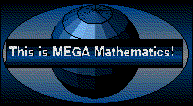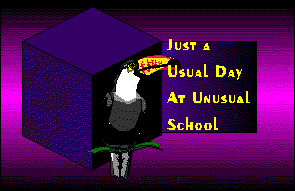


The experience of thinking that something must be true, but not being able to actually prove it "beyond the shadow of a doubt", may lead students to believe that mathematical thinking places unnecessary restrictions on drawing conclusions about the world. The contrary is actually true.
Because of such stringent criteria for establishing and accepting something as true, there is no danger that a revolutionary new idea will appear that shakes the foundations of mathematics, causing mathematicians to have to reject things that they once though were true and start over. New discoveries in mathematics--new truths--are added to what is already known. New ideas may open up whole new fields of inquiry, but they will never cause anything to be removed from the body of knowledge that mathematicians recognize as true.
The play in this section illustrates another aspect of the power of mathematical rigor. We fill our everyday conversation with plenty of information about what we are describing so that our listeners can understand it the way we do. But in mathematics, when we begin asking questions about a collection of objects that we have invented, there are no rules of ettiquite that say these objects should be polite and generous about giving information about themselves. The situation is more like the one at Unusual School.
Mathematicians have to make the most of every little piece of information that they have when they are trying to draw conclusions from what they already know. A common strategy is to try to find out exactly what the possibilities for solutions and conclusions are, and to try to eliminate the ones that are impossible. Sometimes the possibilities are infinite, or not all of them can be eliminated, and mathematicians must use other strategies. But the strategy of listing possibilities and eliminating them one by one will work well for figuring out who's who at Unusual School.